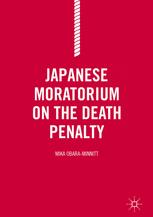

Most ebook files are in PDF format, so you can easily read them using various software such as Foxit Reader or directly on the Google Chrome browser.
Some ebook files are released by publishers in other formats such as .awz, .mobi, .epub, .fb2, etc. You may need to install specific software to read these formats on mobile/PC, such as Calibre.
Please read the tutorial at this link: https://ebookbell.com/faq
We offer FREE conversion to the popular formats you request; however, this may take some time. Therefore, right after payment, please email us, and we will try to provide the service as quickly as possible.
For some exceptional file formats or broken links (if any), please refrain from opening any disputes. Instead, email us first, and we will try to assist within a maximum of 6 hours.
EbookBell Team

4.1
20 reviewsOffering a timely reanalysis of the issue of Japan’s capital punishment policy, this cutting edge volume considers the de facto moratorium periods in Japan’s death penalty system and proposes an alternative analytical framework to examine the policy. Addressing how the Ministry of Justice in Japan justified capital punishment policy during the de facto moratorium periods from 1989 to 1993, from 2009 to 2010 and from 2010 to 2012, the author debates the misconceptions surrounding the significance of these moratoriums.
The book evidences the approach, rationale and evolution of Japan’s Ministry of Justice in consistently justifying capital punishment policy during the different execution-free periods and provides a better understanding of the powerful unelected elite who actually drive the capital punishment system in Japan. Based on parliamentary proceedings, public opinion surveys and periodical reports by both international and domestic human rights NGOs as well as interviews of government ministers, NGO staff, pro- and anti-death-penalty advocates, this text is key reading for those interested in Japan, its government, criminal justice system and policies on the death penalty and human rights.